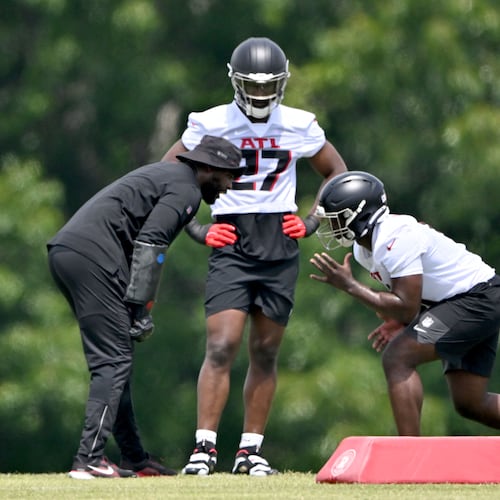In each of his NFL stops as an offensive coordinator, Dirk Koetter has been the new guy on staff.
With each team, Koetter was naturally forced to adjust to the style set by the head coach that had been in place -- whether it was under Jack Del Rio in Jacksonville, Lovie Smith in Tampa Bay, or in each of the times he coached with the Falcons under Mike Smith and Dan Quinn.
But both times with the Falcons, that involved learning how to coach the previous offense that was put in place by a predecessor.
In 2012, Koetter blended his Air Coryell offense with the existing run-oriented scheme that Mike Mularkey had previously installed. He took that hybrid scheme to Tampa Bay, where he was an offensive coordinator in 2015 and head coach from 2016-18. Back with the Falcons, in 2019, Koetter was asked to learn a different style of offense.
This time, it was the scheme former Falcons offensive coordinator Kyle Shanahan installed in 2015. Although Shanahan left after the 2016 season to become the San Francisco 49ers' head coach, the Falcons have kept this system in place in the ensuing years. After two years of Steve Sarkisian running the scheme, Koetter was tasked with learning it a year ago.
Koetter said there hasn’t been a comfort issue with the Shanahan offense. The tough part, he said, was learning the terminology. Entering his second season calling these plays, Koetter believes he will be able to call this offense much more efficiently on game days.
“My comfort level was good both times, but in my second year in this system, I can definitely call things up faster than I could a year ago at this time,” Koetter said. “This was just a little bit of a different language for me. I had to run it through the translation machine sometimes to spit it out in the language I’d been using for my other 30-plus years of coaching. I’m the one that needed some catching up on that, not any of the key players.”
One of the reasons Falcons coach Dan Quinn has kept the Shanahan system in place is to ease the burden on the players. Instead of an entire offense being forced to learn a new system, the idea is for one coordinator to adjust to everyone else.
With the Falcons finding success under Shanahan, which culminated in a 2016 season that ended in the Super Bowl, Quinn knew he wanted to keep this type of offense in place. Each of the two coordinators he’s employed since have adhered to the basics of the offense while adding certain wrinkles to their liking.
Quinn said he wanted to keep the offense uniform so that the players wouldn’t have to adjust to something brand new in the event of a coordinator change.
“That’s a scheme that we wanted to build through,” Quinn said. “A scheme is not something we want to do as a one-time thing. … Having continuity for the players, that’s a big deal. On most teams, when you’re doing well there are opportunities for guys to advance and move up. And when that happens you’d like to see as much consistency as you can. That was important to us and will be moving forward as well.”
Quarterback Matt Ryan said keeping the Shanahan system in place was a great benefit to him since he didn’t have to go through a change in terminology. Under Shanahan and Sarkisian, Ryan saw his numbers jump in the second season. The hope for the offense is that a similar outcome occurs with Koetter guiding this offense in the second season of his second stint with the franchise.
Ryan said he thinks that Koetter is more comfortable calling this particular offense. He noted Koetter no longer takes an extra look at the play sheet and that everything seems “second nature to him.”
“From a player’s perspective, when the language doesn’t change -- we had a lot of people coming back,” Ryan said. “So it’s really one guy changing for 35 other guys as opposed to 35 changing for one. But it’s not easy for that coordinator, too. That’s a tough thing to do, to be the person in charge but being the one making the adjustment. It’s difficult. I thought he did a great job with it. But from a player’s perspective when you’re not changing the terminology.”
When it’s at its best, Shanahan’s system relies on the run to set up the play-action pass. When the stretch running plays are executed well, it’s proved to be a tough offense to slow. However, a year ago, the Falcons averaged only 85.1 rushing yards per game, which ranked 30th. For the Falcons to get back to the level of success they had under Shanahan’s watch, they’ll need to improve their rushing attack.
In San Francisco, Shanahan guided the 49ers to a Super Bowl appearance last season while finishing second in the NFL in rushing at 144 yards per game.
Koetter’s ability to adapt to other offenses, as well as his previous relationship with Ryan, made him an attractive candidate to hire from the Falcons' viewpoint. And entering the 2020 season, Koetter feels better equipped to run the offensive scheme he has since learned over the past year.
“The system Kyle Shanahan put in here is an excellent system as well,” Koetter said. “It’s proven itself. There are several teams in the NFL using it right now, and we’re one of them."
About the Author
Keep Reading
The Latest
Featured

